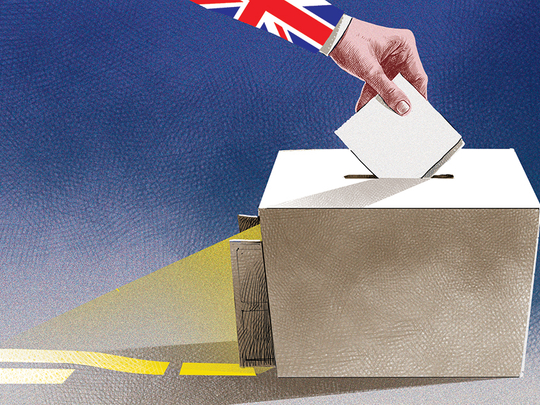
What do you mean by “out”? It seems reasonable to ask those who want Britain to leave the EU just how impenetrable would the subsequent fog be in the English Channel. Would Britain stay in the single market or cut loose entirely? The question goes unanswered. The Vote Leave campaign has turned this silence into an article of faith. A sceptic, in the true sense of the word, might think they had something to hide.
As it happens, the government too has not properly considered what would happen if a disgruntled electorate backed Brexit. That would give David Cameron (or more likely his successor as prime minister) a clear instruction to quit the union, but without guidance or mandate about what to put in the place of membership. Should Britain seek some sort of association agreement? Or should it sever all ties and, in the manner of the Elizabethans, seek to remake its fortunes on the global stage? These are not idle hypotheses. A Brexit vote is a far from fanciful notion.
Cameron is betting otherwise. His premiership could scarcely survive Britain’s departure from its own continent; nor, probably, would the union of the UK. True, Cameron occasionally says he could walk away from an “unreformed” union, but only to impress Conservative MPs. He has told Germany’s Angela Merkel, Francois Hollande of France and just about every other significant world leader that he wants to stay.
The renegotiation, we learnt from his letter this week to Donald Tusk, president of the European Council, is what it was always was: a political device to persuade Tory MPs that British exceptionalism is still possible within the EU. If this sounds like a reckless gamble with the nation’s future, this is because it is precisely that. Harold Wilson’s Labour government performed the same manoeuvre in 1975.
The letter’s demands are at once important and irrelevant. Important in shaping the political dynamic in the Tory party but largely irrelevant to the debate about the merits or otherwise of the EU. The shape of Britain’s relationship with the union is changing, largely because of closer economic integration within the Eurozone; but, assuming he gets most of what he wants, Cameron’s démarche will change little.
There is much to be said for reforms to make the EU work more efficiently, expand the single market and reassert a commitment to open trade. The measures specific to the UK would protect its position outside the euro and highlight the limits of integration. Opting out of “ever closer union” is essentially a political gesture. The negotiations will be tough but a deal is well within the realm of the possible.
The referendum will be fought on different territory. The essence of the case for the EU is just as it was when set out with considerable eloquence by Margaret Thatcher during the 1975 referendum campaign. Britain is a more prosperous and secure nation inside the European club. The Commonwealth, the Anglosphere and the rest are valuable adjuncts to membership rather than realistic alternatives. The EU was, and remains, one of the twin anchors of Britain’s foreign policy. The other is the defence and security relationship with the US embedded in Nato. As anyone in Washington will tell you, you cannot pull up one without raising the other.
The Outs play a consciously fuzzier tune: a Britain unshackled from the EU could run its own affairs and, critically, could shut its borders to migrants. The calculation is that identity and emotion will trump cold economic and political facts. The populist trick is to be anti-everything: anti-elites, anti-big business, anti-globalisation, anti-Brussels and, of course, anti-immigration. During the 1975 campaign Ian Paisley, the Ulster MP, framed Europe as a Papist plot to suffocate British Protestantism. The language may not be quite so colourful this time around.
The promise to “take back control” explains the reluctance of Vote Leave to discuss the alternatives. Once the choices are explored, the precious sovereignty beloved of nativists is exposed as a chimera. We live in a dangerous and interconnected world. States have ceded power to globalisation. Borders are porous. Even rich, advanced nations such as Britain would struggle to advance their vital national interests in splendid isolation.
A post-EU deal along the lines of that secured by the Norwegians, Icelanders or Swiss would leave the primacy of EU law intact while robbing Britain of any voice. At the other end of the spectrum, complete disentanglement would deprive Britain of preferential trade access to scores of third countries and remove all protection for the City of London. The remit of the World Trade Organisation does not extend to financial services. The options in between — a customs union is one — demand the same trade-off between supposed sovereignty and bankable influence.
Britain’s friends abroad — in the Anglosphere and the Commonwealth — understand the realpolitik. Leaders in the US, Australia, Canada, India, Japan and all points between are astonished that Britain should contemplate Brexit. Even Cameron’s new best friend, President Xi Jinping of China, is backing the pro-Europeans. Come to think of it, though, Vote Leave can probably claim one supporter in the pantheon of world leaders. Russia’s Vladimir Putin would love to see Britain weakened.
— Financial Times












